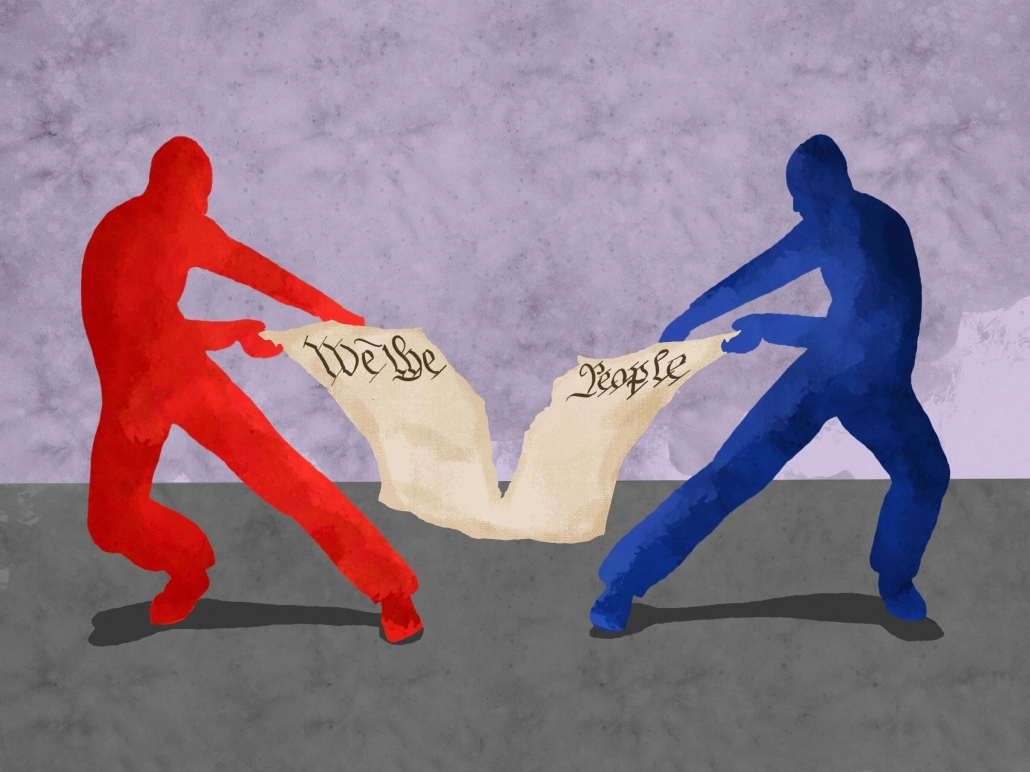LAW & DISORDER
Government affairs are not personal affairs
Politics should never be more important than the law itself.
Politics should never be more important than the law itself.


“Leave the politics out of it!” — a statement far easier said than done. In this day and age, everything can turn political, even having a vegan diet. In its simplest form, politics is about having a basic understanding of the world around you. It’s how individuals and groups make decisions, allocate resources and exercise power within a nation or community.
But it’s not that simple anymore. What once was a tool to make decisions has turned into a game of power where the most powerful yell over each other and the rest suffer the consequences.
Studies conducted by the Pew Research Center in 2020 showed a growing divide between Democrats and Republicans on various issues such as the economy, racial justice, climate change, law enforcement and international engagement. The deep divisions exposed during the 2020 presidential election further exacerbated this rift. Supporters of both major political parties now see their differences as extending beyond politics and policies. When did politics become so deeply personal?
Aristotle would roll over in his grave if he heard what modern-day politics has become. In his “Nicomachean Ethics” Aristotle wrote, “The end [or goal] of politics is the best of ends; and the main concern of politics is to engender a certain character in the citizens and to make them good and disposed to perform noble actions.”
In breaking the word down into its ancient Greek root “polis,” all politics means is a city-state. Now it feels like a cursed word more than anything else. We once lived in a time where Democrats, Republicans, centrists, you name it could sit at a table and make decisions. Albeit not all were the greatest decisions, but hindsight is 20/20 and at least decisions were being made.
Even in 1787, at the very start of the United States when states’ delegates were immensely divided over the drafting of the Constitution, parties were able to come to a compromise for the betterment of their country. Members of Congress were able to put their differences aside to enact the Secondary Education Act of 1965, the Civil Rights Act of 1964, Medicare and the creation of the Corporation of Public Broadcasting.
While state and federal discussions often revolve around divisive topics, politics was once a way to show commitment to prioritize unity and concentrate on shared objectives. In the process of demonizing politics, we’re destroying the one thing that brought us together in the first place.
It seems everyone is involved in politics and has something to say these days, but nothing is getting done — because this isn’t politics, it’s political hobbyism. A term coined by political scientist Eitan Hersh, political hobbyism is a catchall phrase that describes the excessive consumption and engagement in political affairs for one’s personal emotional and intellectual gratification, rather than meaningful civic participation.
With the advent of social media, politics and political hobbyism have become one in the same. But it’s vital that we remember that belonging to a different political party doesn’t warrant exemption from the same legal standards that apply to everyone. We are all allowed to have our own beliefs but politics should build communities up, not tear them down. Supporting one party shouldn’t mean wishing for the downfall of the other, because attacking the other party is the same thing as attacking yourself.
Memphis Commercial Appeal writer David Waters stated, “Regardless [of] who’s driving, we’re all riding in the same car. If it crashes, we all get hurt. We’re all susceptible to the careless driving of unyielding partisans on the left and right.”
Before coming to USC, starting this column and pursuing a career in law, I hated politics. I found it parasitic, grabbing onto everything around me when all I wanted was to live my life and have others live theirs.
Sixth-grade me saw the world through a much simpler lens. Some days, I wish I could go back to that, but most days, I don’t miss that naivete because politics is the society we live in and not knowing your reality is how you get tangled in a web of misinformation.
If you don’t like the car you’re in, you can leave, but you can’t grab the wheel as you please. We’ll all crash and burn — I mean, we already are. Even when the world is in flames, instead of trying to find a solution, we continue to point fingers and find blame.
Helen Nguyen is a graduate student writing about law and social issues in her column, “Law & Disorder.” Her column, “Law and Disorder,” runs every other Wednesday.
We are the only independent newspaper here at USC, run at every level by students. That means we aren’t tied down by any other interests but those of readers like you: the students, faculty, staff and South Central residents that together make up the USC community.
Independence is a double-edged sword: We have a unique lens into the University’s actions and policies, and can hold powerful figures accountable when others cannot. But that also means our budget is severely limited. We’re already spread thin as we compensate the writers, photographers, artists, designers and editors whose incredible work you see in our daily paper; as we work to revamp and expand our digital presence, we now have additional staff making podcasts, videos, webpages, our first ever magazine and social media content, who are at risk of being unable to receive the support they deserve.
We are therefore indebted to readers like you, who, by supporting us, help keep our paper daily (we are the only remaining college paper on the West Coast that prints every single weekday), independent, free and widely accessible.
Please consider supporting us. Even $1 goes a long way in supporting our work; if you are able, you can also support us with monthly, or even annual, donations. Thank you.
This site uses cookies. By continuing to browse the site, you are agreeing to our use of cookies.
Accept settingsDo Not AcceptWe may request cookies to be set on your device. We use cookies to let us know when you visit our websites, how you interact with us, to enrich your user experience, and to customize your relationship with our website.
Click on the different category headings to find out more. You can also change some of your preferences. Note that blocking some types of cookies may impact your experience on our websites and the services we are able to offer.
These cookies are strictly necessary to provide you with services available through our website and to use some of its features.
Because these cookies are strictly necessary to deliver the website, refusing them will have impact how our site functions. You always can block or delete cookies by changing your browser settings and force blocking all cookies on this website. But this will always prompt you to accept/refuse cookies when revisiting our site.
We fully respect if you want to refuse cookies but to avoid asking you again and again kindly allow us to store a cookie for that. You are free to opt out any time or opt in for other cookies to get a better experience. If you refuse cookies we will remove all set cookies in our domain.
We provide you with a list of stored cookies on your computer in our domain so you can check what we stored. Due to security reasons we are not able to show or modify cookies from other domains. You can check these in your browser security settings.
These cookies collect information that is used either in aggregate form to help us understand how our website is being used or how effective our marketing campaigns are, or to help us customize our website and application for you in order to enhance your experience.
If you do not want that we track your visit to our site you can disable tracking in your browser here:
We also use different external services like Google Webfonts, Google Maps, and external Video providers. Since these providers may collect personal data like your IP address we allow you to block them here. Please be aware that this might heavily reduce the functionality and appearance of our site. Changes will take effect once you reload the page.
Google Webfont Settings:
Google Map Settings:
Google reCaptcha Settings:
Vimeo and Youtube video embeds:
The following cookies are also needed - You can choose if you want to allow them:
